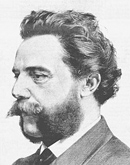

Vojtěch Ignác Ullmann
*23. 4. 1822 – Prague, Czech Republic
†17. 9. 1897 – Příbram, Czech Republic
Biography
Vojtěch Ignác Ullmann was a Czech architect of the historicism period. He studied at the Prague Polytechnic and the Vienna Academy of Fine Arts under professors Augusta von Siccardsburg and Eduard van der Nüll. After completing his studies, he traveled to Italy and Germany. From 1854, he worked in Prague as an independent architect. He collaborated with architects Antonín Baum, his nephew Bedřich Münzberger, and Antonín Viktor Barvitius, whose sister Terezie Barvitiová he married in 1856. By 1874, he had realized several buildings in Prague. However, when he did not succeed in architectural competitions for the construction of the National Theatre and Rudolfinum, he withdrew to the countryside, first to Dubence, where he owned the local castle from 1879 to 1889, and then to Příbram, where he died in 1897 and is buried in the local cemetery.
He was a typical representative of historicism. His early work was eclectic, mixing medieval stylistic elements with neo-Romanesque and neo-Gothic styles. In the later phase of his work after 1860, he was significantly influenced by the neo-Renaissance of Gottfried Semper and the Vienna neo-Renaissance school, expanding its concept with inspiration from Venetian, French, and domestic Renaissance forms. Together with Josef Zítek, he was among the first Czech proponents of Italian neo-Renaissance, referred to as Palladianism due to its inspiration from the patterns of Andrea Palladio.
Vojtěch Ignác Ullmann was a Czech architect of the historicism period. He studied at the Prague Polytechnic and the Vienna Academy of Fine Arts under professors Augusta von Siccardsburg and Eduard van der Nüll. After completing his studies, he traveled to Italy and Germany. From 1854, he worked in Prague as an independent architect. He collaborated with architects Antonín Baum, his nephew Bedřich Münzberger, and Antonín Viktor Barvitius, whose sister Terezie Barvitiová he married in 1856. By 1874, he had realized several buildings in Prague. However, when he did not succeed in architectural competitions for the construction of the National Theatre and Rudolfinum, he withdrew to the countryside, first to Dubence, where he owned the local castle from 1879 to 1889, and then to Příbram, where he died in 1897 and is buried in the local cemetery.
He was a typical representative of historicism. His early work was eclectic, mixing medieval stylistic elements with neo-Romanesque and neo-Gothic styles. In the later phase of his work after 1860, he was significantly influenced by the neo-Renaissance of Gottfried Semper and the Vienna neo-Renaissance school, expanding its concept with inspiration from Venetian, French, and domestic Renaissance forms. Together with Josef Zítek, he was among the first Czech proponents of Italian neo-Renaissance, referred to as Palladianism due to its inspiration from the patterns of Andrea Palladio.
The English translation is powered by AI tool. Switch to Czech to view the original text source.











